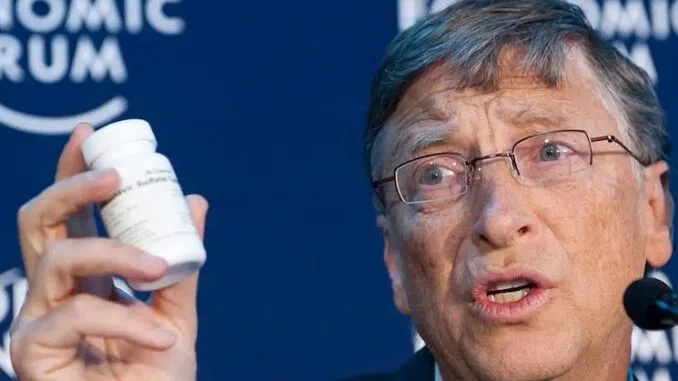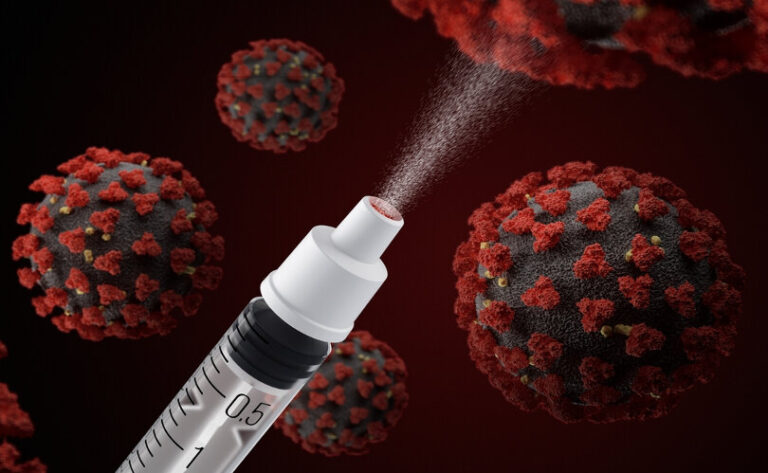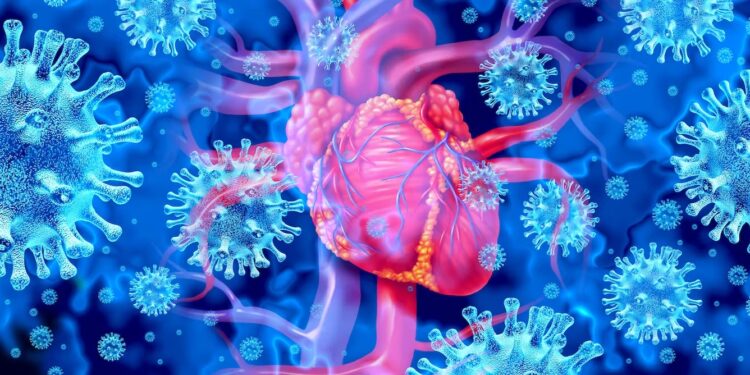They Suffered Myocarditis After COVID-19 Vaccination. Years Later, Some Still Haven’t Recovered
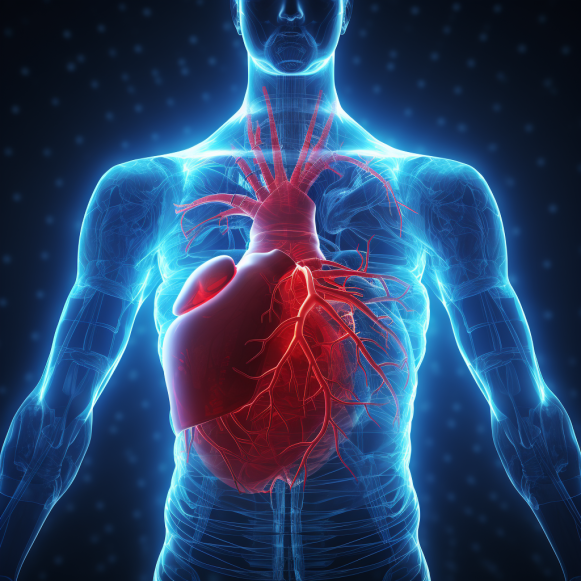
Jacob Cohen was feeling increasingly hemmed in by the military and his mother.
Mr. Cohen refused to be immunized against COVID-19. He was well aware that the vaccines would not be available for long. He was concerned for their safety.
While he initially refused to receive the vaccine, he was forced to remain on base while vaccinated soldiers left. Military commanders also put pressure on him, scheduling a vaccination appointment for him and contacting his mother as part of a multifaceted campaign.
“They said to me, ‘Come on. It’s your mother calling. She’s sobbing. She is concerned. ‘What would you not do for her?'” Mr. Cohen told The Epoch Times that he requested anonymity because he was concerned about the consequences of going public.
“I refused to take the vaccine. “I didn’t believe it,” he admitted.
But he wanted to make his mother happy.
“I would do anything for her,” he declared.
Mr. Cohen received his first Pfizer-manufactured vaccine dose on September 22, 2021. He was 21.
Two weeks later, at 3 a.m., he was awakened by a sharp pain.
“It felt like my heart was trying to get out of my chest,” Mr. Cohen explained.
The soldier has previously experienced pain.
“I never felt something like this,” he told me.
Mr. Cohen went to the hospital with a friend and was placed in quarantine because he was not fully vaccinated. Thirty minutes had passed.
“I felt like it was the first time in my life I actually started seeing flashbacks of things that I did in my life—I felt like I was truly dying,” he told me.
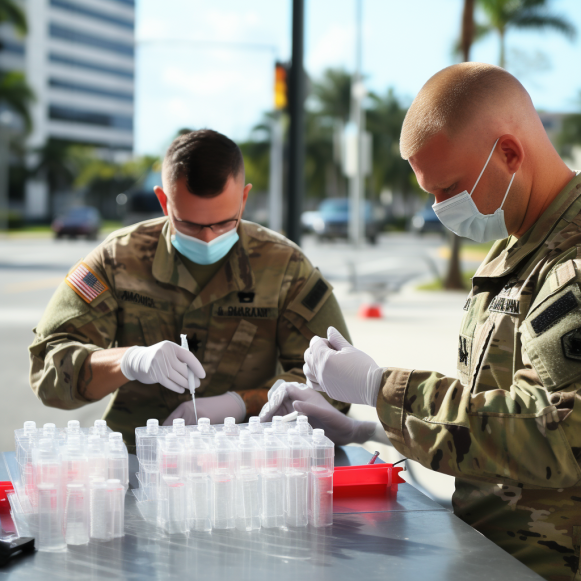
Doctors finally arrived and performed tests. Mr. Cohen was diagnosed with perimyocarditis, or inflammation of the heart muscle and surrounding tissue.
They said he was fortunate. He would have needed open heart surgery if he had arrived a little later.
He was in the hospital for three days, taking medication and pills. He was told not to engage in any physical activity for at least six months after being discharged. He had to go in for regular checkups and take a pill every day.
Mr. Cohen’s cardiac MRI six months after leaving the hospital revealed concerning findings. His heart had not yet recovered.
He was given more pills by the doctors.
“They told me maybe I will need them for the rest of my life,” Mr. Cohen went on to say.
The military declared him ineligible to serve for the rest of his life and discharged him.
He is still in pain.
“I’ve been feeling, I’m not sure if it’s trauma or something, but it feels sometimes like a sting there, a short sharp pain,” Mr. Cohen told me.
He is also unable to do everything he used to do.
“I was practicing. I was participating in a soccer game. “I did a lot of physical things that I can’t afford to do anymore,” Mr. Cohen explained.
‘Continued Pain’
Dr. Adam Hirschfeld was among the first people in the United States to receive a COVID-19 vaccine.
The orthopedic surgeon was driven by a desire to keep his patients healthy.
“I didn’t want to put any of my patients at risk,” Dr. Hirschfeld explained to The Epoch Times.
In January 2021, he received a Moderna primary series consisting of two doses. He was 36.
Dr. Hirschfeld experienced chest discomfort and numbness in his left arm three days after the second dose.
An MRI of the heart confirmed the presence of inflammation. Dr. Hirschfeld was given medication and released two days later.
Dr. Hirschfeld has since had a dozen electrocardiograms, a half-dozen echocardiograms, and a follow-up cardiac MRI.
“I went from being completely healthy—no issues, no medications—to seeing 10 different doctors in the blink of an eye,” said Dr. Hirschfeld.
The follow-up MRI, performed approximately 18 months after the vaccinations, revealed normal cardiac function.
Dr. Hirschfeld, on the other hand, is still in pain.
“I have continued chest pain on the right side, and then I have neuropathic type pains in my neck and shoulder areas,” he told the paper. “I have it when I wake up, and it’s there when I go to sleep.”
The doctor is physically and mentally affected by his or her suffering.
“Having chest pain every day for two and a half years is very disconcerting,” he told me.
Requests for comment from Pfizer and Moderna were not returned.
Mr. Cohen lives in Israel and has had his shots fired. Dr. Hirschfeld currently resides in the United States.
In those countries, the first cases of myocarditis following COVID-19 vaccination were reported in January 2021. It had only been a few weeks since authorities had cleared and recommended the vaccines for large segments of the population, including many young, healthy people.
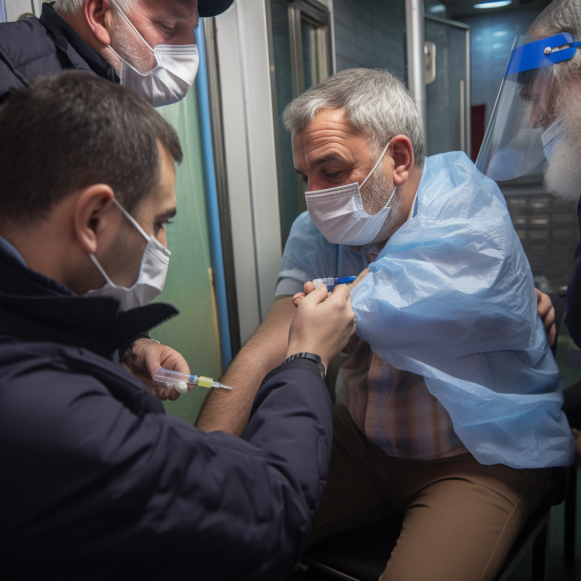
Authorities initially concealed reports of myocarditis from the public. Israel was the first to admit that there was a possible link between the vaccines and the inflammation. The United States followed suit in June 2021, when the Centers for Disease Control and Prevention (CDC) declared a “likely association.”
Even after the link was made public, officials and many experts claimed that the cases of myocarditis were minor. Authorities acknowledged that the majority of patients were hospitalized, but they stated that patients could expect to recover without treatment and with rest.
The myocarditis is “rare but mild,” according to Dr. Rochelle Walensky, director of the Centers for Disease Control and Prevention at the time, on “Good Morning America” on June 24, 2021.
According to Dr. Walensky, the cases were “self-limited,” or did not require treatment to resolve.

Dr. Jeremy Faust, editor-in-chief of MedPage Today and a professor at Harvard Medical School, described the cases two days later on X, formerly known as Twitter, as “self-limited troponinemia,” or elevated troponin levels that would resolve on their own. Troponin is a protein found in the heart that acts as a marker of heart damage.
Based solely on case reports, those claims were already incorrect.
On May 18, 2021, doctors reported that a previously healthy 24-year-old man in Massachusetts experienced severe chest pain and went to the emergency room. He was eventually discharged with a prescription for a beta-blocker and anti-inflammatory medications, as well as instructions to refrain from strenuous activity for three months.
Another early case involved a previously healthy 16-year-old boy in California who complained of “stabbing chest pain” and went to the emergency room for assistance. On a scale of one to ten, he rated the pain as six to eight. Doctors admitted him to intensive care due to his symptoms. He was hospitalized for six days before being released.
As with many early case reports, no follow-up data was provided, making it impossible to conclude that the cases had been fully resolved.
“Unless you’ve experienced it individually, you can’t tell somebody that their case was mild,” said Dr. Hirschfeld. “High troponin levels indicate that your cardiac muscle is deteriorating.”
“That is something permanent. So telling me that my cardiac muscle breakdown is minor is quite insulting.”
Soon after, signs of persistent symptoms appeared in the literature. On June 29, 2021, for example, US military researchers reported that 7 of 23 patients continued to experience chest discomfort weeks or even months later. Even worse outcomes were predicted earlier. In February 2021, two deaths were reported to US authorities, while another two were reported in Israel in the spring. Both Israelis who died had previously been young and healthy.
Professional Biker Affected
Kyle Warner was a professional mountain bike racer in May 2021 when he received his first COVID-19 vaccine. The following month, he finished a primary series.
Mr. Warner, who lives in the western United States, is a teacher who wanted to protect his students from COVID-19. Based on observational data, the CDC and others promoted the notion that vaccines reduced or even prevented transmission.
“The general consensus was that these were safe and effective. “If you get them, you no longer need to wear a mask, and you can’t transmit or catch COVID,” Mr. Warner explained to The Epoch Times. “I spend a lot of time with older people and help them learn.”
“I wasn’t particularly afraid of COVID. Not that I didn’t respect it, but I wasn’t concerned that it would kill me. But I was worried about infecting someone else, especially our elderly clients.”

Mr. Warner was hospitalized after being diagnosed with myopericarditis following his COVID-19 vaccination.
Mr. Warner was bedridden for weeks after being discharged.
“There were times when I couldn’t even get out of bed without passing out or blacking out,” Mr. Warner explained to The Epoch Times. “It was definitely eye-opening.” I felt like I went from being 28 to 88 years old.”
Mr. Warner was diagnosed with myopericarditis, as well as two other conditions, postural orthostatic tachycardia syndrome and mast cell activation syndrome, after receiving COVID-19 vaccination.
Mr. Warner’s energy levels were restored thanks to hyperbaric oxygen, which relieved some of Dr. Hirschfeld’s pain.
However, the cyclist, who did not ride again until February 2022, still suffers from pain, particularly when exercising in the summer.
Mr. Warner wears a heart rate monitor, which he became acquainted with during his racing career.
Mr. Warner pushed himself during a recent ride, giving it his all for four minutes. His heart rate increased to 189 beats per minute, the highest since the injury.
“I did fine, but for the next few weeks, I had lingering chest pain and tightness.” “And then, about four days later, it was pretty significant where I was having trouble sleeping and my heart felt like it was palpitating every now and then, and then—even more than a week later—I still had a little bit of chest tightness and pain,” Mr. Warner explained.
“It scared me because it’s been well over a year since my last hyperbaric treatment and I’m still dealing with it.” When I try to push myself harder, I end up paying for the next few days to a week.
“Back in the day, I would be able to do that with no problem at all.”
Doctors who have spoken with Mr. Warner have informed him that when his heart becomes stressed, his immune system signals it to attack and inflame it.
He works hard to keep his heart rate below 160 beats per minute.

14-Year-Old Rushed to Hospital
Aiden Ekanayake awoke in the middle of the night with a headache.
“Every deeper breath was like knives in my chest,” Aiden, who is from Georgia, said on a podcast.
It was June 12, 2021, and he had just received his second dose of Pfizer’s vaccine. He was 14.
Aiden was able to fall asleep by breathing shallowly but was quickly awakened. He went to his mother, who took him to the hospital right away.
Anomalies were discovered during tests. He was taken to the emergency room, where additional tests confirmed that the vaccine was to blame.
Aiden was hospitalized for four days. He was inactive for more than four months after being discharged.
“I’m not sure where they get the ‘two days and you’re done, you’re good’ thing. “That’s a crock of [expletive],” Aiden’s mother, Emily Ekanayake, told The Epoch Times.
Ms. Ekanayake had read early Israeli studies that found an increased risk of myocarditis in young males who had received the Pfizer vaccine, but she and her son concluded that the benefits outweighed the risks.
“I was really scared of COVID,” Ms. Ekanayake admitted.
Aiden stated that he wanted to get vaccinated to protect himself and his brother, both of whom suffer from asthma.
His doctor also advised him to get the vaccine. The CDC director stated shortly before Aiden’s vaccination that the agency found no safety signal for myocarditis. After initially being available only to those 16 and older, US officials cleared and recommended the vaccine to virtually all children aged 12 to 15.
Aiden was able to resume exercise after passing a cardiopulmonary stress test.
The test result was “probably more like that of an old man,” according to Ms. Ekanayake.
“His CO2 level was low,” she explained. “He couldn’t run very far. He still has a lot of work to do in that direction. But he enjoys walking.
“I’m still concerned about strenuous activity.” I can’t help myself. “I don’t think that will ever go away.”
‘A Human Being in Half’
Before receiving his Pfizer vaccine, Alon was a competitive swimmer who trained every day.
In addition to the round trip to the pool, the Israeli boy had to wait in line to take a COVID-19 test.
School was another issue. When fellow students became ill, a quarantine of those who had not been vaccinated was imposed.
“There was no chance of arriving at school and not being informed the next day that someone is sick and you [need to] be in quarantine,” Alon’s mother told The Epoch Times, speaking on the condition of anonymity due to fear of professional repercussions. “It’s not possible. It’s the equivalent of locking up a child for no reason.”
Alon’s mother witnessed vaccinated people become ill despite the vaccine, shattering her belief that the vaccine was effective. However, she had little information about potential side effects and decided that the benefits, including keeping her son in school, outweighed the risks.
“He was tired of the quarantines and tests,” she told me.
The first dose was administered on December 3, 2021, and the second dose was administered on December 24, 2021. Alon was nine years old.
Alon fell into a deep sleep a few days later.
“It was a little scary,” Alon’s mother said.
Doctors performed tests on him, including a heart check. They couldn’t figure out what was wrong.
“The child is not functioning,” said Alon’s mother. “He was like half a human for the whole month.”
The breakthrough occurred when Alon stated, “My heart hurts.” Myocarditis was discovered through new testing. Doctors concluded that the vaccination caused it.
Alon stayed in the hospital for one night before being released. He returned a week later, complaining of chest pain. Normalization was demonstrated by the tests.
Other issues plagued Alon in the months that followed. He had gone blind. His leg had swollen. His lymph nodes grew in size.
No heart problems were discovered during follow-up visits. The other symptoms subsided, and Alon was cleared to return to sports. He spends hours playing every day. But he is still in pain nearly two years later.
“He has periods when his heart hurts,” Alon’s mother explained. “Everything is fine for a few months at a time. Then it returns unexpectedly.”
She has decided to take her son to the doctor only in cases of emergency. He becomes ill whenever he visits a doctor. He also refuses to have any further blood tests.
“Perhaps it’s a strained muscle there.” “The heart is normal, but it becomes very tight for a few seconds,” Alon’s mother explained. “It vanishes. We avoid all types of tests. I don’t take him to the doctor unless I believe it’s a matter of life and death.”
Worst Agony of His Life
Ben Cutler enjoyed going to the gym. He exercised five days a week.
Mr. Cutler received a Moderna booster shot on December 14, 2021, in order to avoid becoming infected by the new Omicron coronavirus variant. He was 26.
Mr. Cutler began to experience symptoms such as fatigue the next day. He went to bed early, but was startled awake at 2:30 a.m.
“I woke up and have never felt so terrible in my life,” Mr. Cutler wrote in a summary of his ordeal.
After several days of attempting to sleep away the pain, a family member persuaded the Massachusetts resident to visit the hospital.
Doctors performed tests and discovered troponin-T levels nearly 90 times higher than the normal maximum levels.
Myopericarditis was diagnosed in Mr. Cutler. He was eventually released, but his ordeal was far from over.
“It was convenient that I could work from home.” And I could start working at 7 or 8 a.m., work until 2 p.m., and then just lay on my couch for seven hours,” he told The Epoch Times.
Mr. Cutler estimated that he had spent hundreds of hours on his couch in pain. His pain level was frequently a five on a scale of five. He shed 25 pounds.
He claimed that a 10-minute walk to the grocery store would have been the most exercise he could get in a day. He talked about having to “budget” his energy.
His condition began to improve after about two months. Some days, the pain was reduced to threes. Then come the twos. Then there are zeros.
Mr. Cutler was able to resume weight lifting by the end of April 2022. A subsequent cardiac MRI revealed a minor fibrosis, or scar, but he believes he has recovered.
“I haven’t been having any major issues,” he told me. “Everything’s pretty good.”
Evidence accumulates
The stories add to the growing body of evidence that a significant proportion of people who suffer from vaccine-induced myocarditis are affected for months or years—if they survive.
On August 10, 2021, US researchers who followed up with 15 children hospitalized with myocarditis after COVID-19 vaccination discovered that four of the patients had “persistent symptoms.” Other researchers in the United States announced on November 1, 2021, that 7 of 54 young patients who developed myocarditis after vaccination still had symptoms, including chest pain.
On September 21, 2022, government researchers reported that nearly half of myocarditis patients who responded to a US government survey said they continued to experience symptoms, including chest pain, months after receiving COVID-19 vaccination. Meanwhile, Hong Kong researchers reported on September 23, 2022, that 35% of 28 young myocarditis patients who were followed up with at least 61 days after COVID-19 vaccination reported continued symptoms such as shortness of breath.
“Although post-COVID-19 vaccination myocarditis has a favorable prognosis and is considered curable, it may leave abnormalities in the myocardium, as observed in this case; it may therefore be premature to declare it as a complication with a good prognosis,” the researchers said in 2022.
More recent data show that some patients have yet to recover.
This includes 23% of 60 people who told the CDC that they were still experiencing chest pain at least a year after being diagnosed with myocarditis.
Other studies have discovered that even after symptoms subside, follow-up testing reveals abnormalities.

Heart scars were discovered in cardiac MRIs performed seven to eight months after myocarditis diagnoses, according to Israeli researchers on March 23, 2022. In a study published around the same time, researchers in the United States described similar findings. Other researchers in the United States who imaged 15 adolescents at least 76 days after they were discharged from the hospital discovered persistent late gadolinium enhancement in 80% of the patients.
Abnormal levels of late gadolinium enhancement are frequently used by researchers to diagnose heart scarring.
Prior to the pandemic, myocarditis cases with enhancement were frequently associated with poor outcomes such as heart transplantation or death.
“It’s going to be a small percentage of the people who recovered from myocarditis, but some of them may have longer-term problems and morbidity, and some of them may develop actual disability,” Dr. Andrew Bostom, a heart expert in the United States, told The Epoch Times.
While the majority of patients had “mild myocarditis, which is mostly gone,” “it’s true that scars can remain, because it’s an inflammation of the heart muscle,” said Dr. Yehuda Adler, a member of the Israeli Ministry of Health’s National Council for Prevention and Treatment of Cardiovascular Diseases. “I’m definitely following these people even today, two years later, and I’ll continue to follow them.”
Not every patient experiences persistent symptoms or abnormalities. Some people have reported complete remission of their symptoms, as well as no abnormal signs in follow-up testing.
Dr. Rabea Asleh, director of the heart failure unit and the cardiovascular research center at Jerusalem’s Hadassah University Medical Center, said his team is also monitoring patients to ensure their well-being.
He told The Epoch Times that all but one of his patients’ symptoms had subsided.
“If this has any clinical significance regarding the flare-up of the disease later on or the deterioration in function after a few years, we do not know,” the doctor said. “But deterioration in function after a few years is unlikely.”
Dr. Bostom was less certain.
“One thing that I’m certain of is that the jury is out,” he told reporters. “We need to collect a lot more information and see how people are really doing long term, particularly the young people.”
Uncertain Pressure
Many young people, including Mr. Cohen, received COVID-19 vaccines under duress.
Israeli military authorities punished the unvaccinated by taking away their leave and forcing them to wear a special vest and isolate themselves in their quarters.
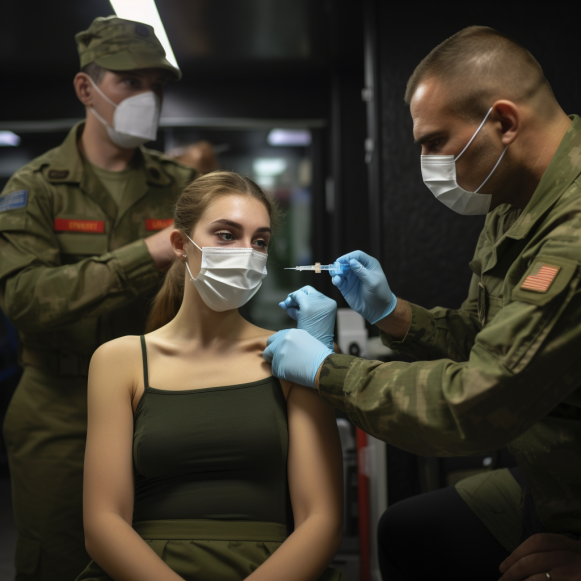
“This is a population of young and healthy soldiers, in whom COVID is mild and transient, and there is no justified reason to vaccinate them,” Dr. Yoav Yehezkelli, an internal medicine and medical management specialist, wrote on Facebook. “Vaccinating the soldiers was not only folly but a lack of professionalism and a violation of medical ethics.”
Others, like Alon, faced repeated disruptions to their daily lives if they did not receive a vaccine, despite evidence that post-infection immunity is broad and superior to vaccination immunity.
CDC studies later discovered that natural immunity, or immunity that develops after recovery, was superior to vaccination against the Delta and Omicron coronavirus variants.
In order to persuade fence-sitters to get vaccinated, top US officials made false claims about vaccine effectiveness, such as claiming that vaccinated people couldn’t get sick or spread the virus.
“Even in December 2020, you can’t make that logical leap.” “Yet, they made that logical leap,” Dr. Jay Bhattacharya, professor of health policy at Stanford University’s School of Medicine, told EpochTV’s “American Thought Leaders” program.
“They premised their policy recommendations—the vaccine passports, the mandates, the coercion, and also the gaslighting of people who are actually vaccine-injured, on this idea that we have to get a sufficient fraction of the population vaccinated for the disease to go away.”
The vaccines’ hype led a number of universities in the United States to mandate them, even after researchers concluded that booster mandates were unethical, in part because they were associated with more serious adverse events than hospitalizations caused. Mandates were also imposed by the federal government on the military, workers, contractors, and private health care facilities.
The mandates have been defended by the White House.
“Our administration’s vaccination requirements helped ensure the safety of workers in critical workforces including those in the healthcare and education sectors, protecting themselves and the populations they serve, and strengthening their ability to provide services without disruptions to operations,” the White House said in a recent press release.
Typical Symptoms and Treatments
Doctors discovered that nearly all people who develop myocarditis after receiving the COVID-19 vaccine experience chest pain.
A meta-analysis of 200 case reports, for example, discovered that 98 percent of patients presented with chest pain. Fever and breathing difficulties were also common symptoms.
According to case reports, surveillance databases, and patients, patients frequently experience symptoms within a week of vaccination.
Early detection and treatment can help to avoid further deterioration. Most patients are restricted from exercising until they pass a cardiac stress test.
The goal of the test, according to Dr. Anish Koka, a cardiologist in the United States, is to detect lingering problems in a controlled setting in which the patient exercises at less than maximum capacity. Problems detected on the test may preclude participation in competitive sports and may necessitate invasive therapies such as the placement of a defibrillator.
Although some health officials and doctors claim that myocarditis resolves on its own, many patients have received medication.
Many doctors prefer colchicine, which is typically used to treat gout.
Mr. Cohen was first given colchicine. He was later instructed to take Tritace on a daily basis, an angiotensin-converting enzyme inhibitor used to treat hypertension after serious problems such as heart failure.
For two weeks, Mr. Cutler took aspirin. After experiencing back pain, he switched from colchicine to ibuprofen.
Intravenous immunoglobulin, a pooled antibody, beta-blockers, anti-inflammatory medications such as methylprednisolone, and ramipril, another angiotensin-converting enzyme inhibitor, are among the other treatments.
‘Ignored’
There are several common themes that connect the myocarditis patients who are speaking out. This includes the impression that they were duped into getting the vaccines.
“You begin to realize that, first and foremost, the authorities were aware of these potential side effects.” “They just chose not to disclose it, or to disclose it only in small letters on a few websites,” Mr. Cohen explained.
Mr. Warner described growing up on welfare and coming to believe that the government was there to help him. He now believes that financial incentives, such as the kickbacks allegedly received from Moderna, have corrupted parts of the government.
Patients are also left feeling abandoned.
“A lot of us are still dealing with significant issues that I think are being ignored,” he said.
It hasn’t helped that US authorities, who have aggressively promoted the vaccines, have refused to compensate or otherwise assist many victims.
Only three people have been compensated for post-vaccination myocarditis by US authorities, who are responsible for compensation because vaccine manufacturers are immune from liability. The largest payout was only $3,957.66.
Ms. Ekanayake and Mr. Cutler both applied for compensation but have yet to hear back. While insurance covered the majority of Aiden’s medical bills, his parents still had to pay close to $10,000 out of pocket. Mr. Cutler paid approximately $5,000 due to high deductibles.
There is still a massive backlog of applications, and some people who have been diagnosed with vaccine injuries have been denied.
Patients with myocarditis frequently mentioned the help they received from family and friends as they recovered. But not all of them.
“I was disowned by many of my friends for speaking out about this early on,” said the actor. “It’s been interesting to see so many of them come back around and apologize to me.”


